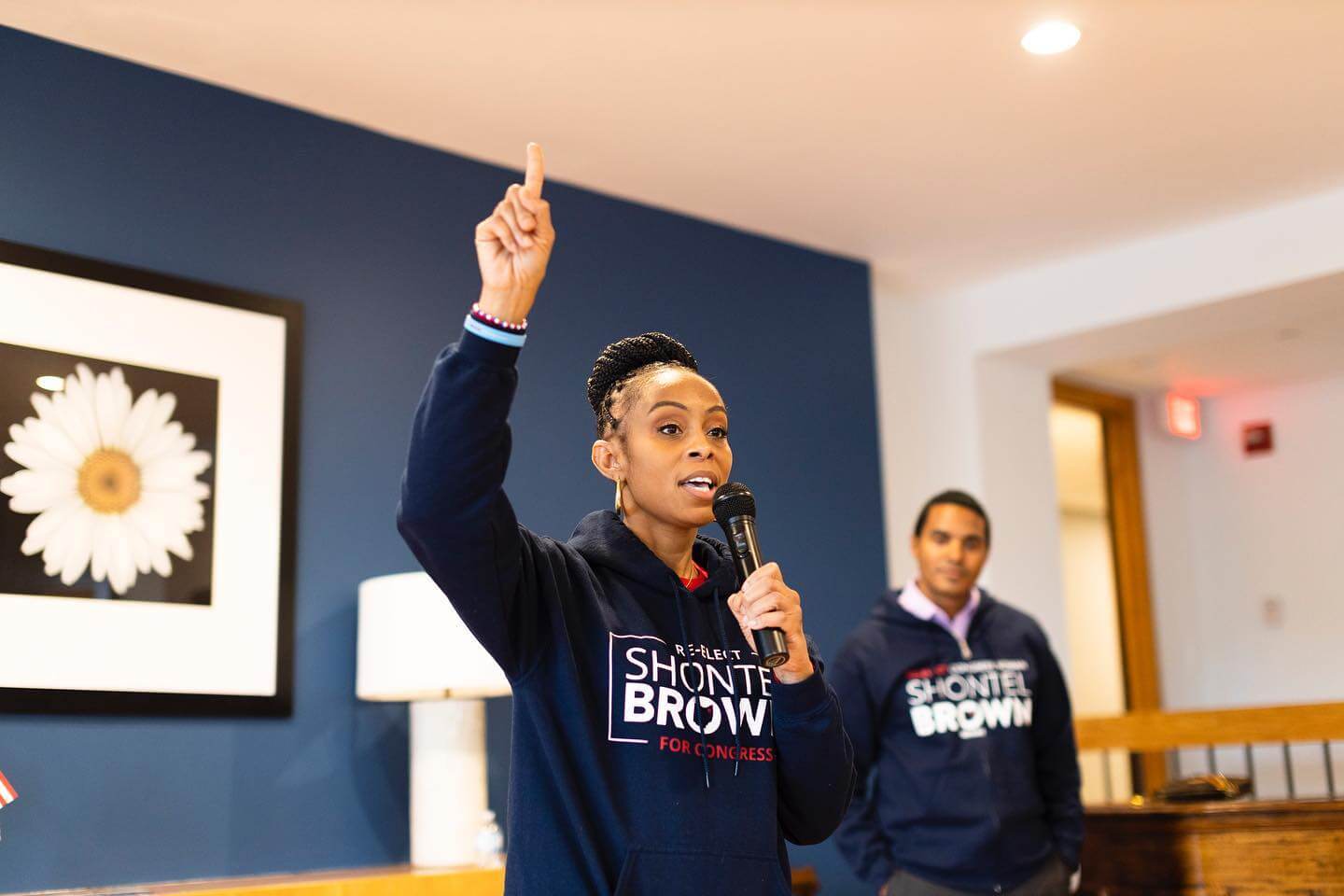Jewish groups step up spending in Ohio congressional race
The Democratic Majority for Israel and AIPAC’s Super PAC United Democracy Project have spent close to $1.5 million to boost Rep. Shontel Brown.

Graphic by Angelie Zaslavsky
A rematch primary between two Democrats for a seat in the U.S. House of Representatives has turned into a hot contest for the Jewish vote with both candidates investing in outreach, and Jewish groups increasing their spending ahead of Tuesday’s election.
Independent expenditure committees formed by the American Israel Public Affairs Committee (AIPAC) and Democratic Majority for Israel (DMFI) to support pro-Israel candidates have invested a combined $1.5 million in television and digital ads, while other Jewish groups are focusing on a targeted get-out-the-vote effort.
The 11th District is a safe Democratic seat that includes Jewish neighborhoods in Cleveland, the city of Lakewood that Bernie Sanders won in the 2016 and 2020 presidential primaries, and Cleveland’s West Side which has a significant number of Palestinian Americans. The race is seen as a proxy fight between the establishment and outside progressives trying to gain more of a foothold in the party.
Shontel Brown, the incumbent establishment candidate who has received the endorsement of President Joe Biden and congressional leaders, and Nina Turner, the more progressive challenger, have both increased their efforts in appealing to Jewish voters, who are estimated at just 5% of the electorate.
How the candidates are spending their time in the community
Brown held a campaign rally on Sunday outside the Green Road Synagogue in Beachwood with Rep. Hakeem Jeffries of New York, who serves as chair of the Democratic Caucus. On Saturday, she appeared with Rep. Ritchie Torres, a pro-Israel progressive from New York, on the east side of Cleveland. Brown also attended Friday night Shabbat services at Temple Tifereth-Israel, a Reform synagogue in the area.
Last Wednesday, on the eve of Holocaust Remembrance Day, Brown introduced legislation to make the Kol Israel Holocaust Memorial at Zion Memorial Park in Bedford Heights a national monument.
Darryle Torbert, Brown’s campaign manager, said the congresswoman isn’t just “paying lip service to win.”
Touting Brown’s voting record in support of Israel and Jewish causes, Torbert said the campaign remains “hopeful and grateful” that they have earned the support of the Jewish community in the same way they came out to support her in the competitive special election last August.
For her part, Turner has attempted to push back against perceptions that she is anti-Israel, a label she says was applied to her in an expensive and negative campaign organized by establishment Jewish and pro-Israel groups. She’s worked to clarify her positions in private meetings with local rabbis and leaders and in targeted campaign ads.
Turner held a virtual town hall meeting on Wednesday with members of the Jewish community, saying she’s prioritizing outreach to expand her base of allies if elected to Congress. “People can call me many things, but what you cannot call me is anti-Israel, antisemite,” Turner said in her remarks. “That hurt me so very much.”
How much money Jewish groups are spending
DMFI’s PAC has so far spent in the competitive primary close to $1 million in television and digital ads, with a little over $300,000 in negative commercials against Turner, according to recent FEC filings.
AIPAC’s Super PAC, United Democracy Project, has invested some $453,000, mostly in attack ads against Turner.
The TV commercials make no mention of Israel, but rather focus on highlighting broader policy differences.
Mark Mellman, DMFI’s chief executive, said the estimated $1.1 million his group will end up spending on this race is a way to “confirm” the message sent by Brown’s victory in last August’s primary to succeed Rep. Marcia Fudge, who resigned to join Biden’s cabinet, that being pro-Israel is “not only smart policy but also good politics.” A Turner win on Tuesday, he suggested, “will undercut that message dramatically.”
The Jewish Democratic Council of America – which spent $35,000 in targeted digital ads, text messages, and emails in last year’s primary is spending much less this cycle. Halie Soifer, JDCA’s chief executive, said the group will spend overall “five figures” in the coming days on a get-out-the-vote effort.
“We are very cost-effective and efficient with how we target voters,” Soifer said in an interview. She suggested that the Jewish vote will not be a determining factor in ensuring Brown’s victory as compared to last year.
Pro-Israel America, a bipartisan group that supports pro-Israel candidates, said it will spend on digital outreach and has raised $23,000 in donations for Brown’s campaign through their portal. The group spent $50,000 last year.
There have not been any public polls in this race. Brown won 50.2 percent of the vote, while Turner got 44.5 percent during last year’s matchup. New maps, as a result of redistricting, added 30% of new voters that are up for grabs.
















